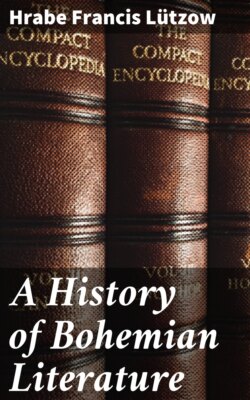Читать книгу A History of Bohemian Literature - hrabe Francis Lützow - Страница 8
На сайте Литреса книга снята с продажи.
FOOTNOTES:
ОглавлениеTable of Contents
[1] Königinhof is a small town in North-Eastern Bohemia.
[2] Some of the poems of the Manuscript of Königinhof were translated into English many years ago by the late Sir John Bowring, whose knowledge of the Bohemian language was, however, very slight. The late Rev. A. H. Wratislaw published in 1852 an English translation of the Manuscripts of Königinhof and Grüneberg.
[3] My authority for this statement is Mr. Adolphus Patera, chief librarian of the Bohemian Museum at Prague, and one of the greatest living authorities on Bohemian palæography.
[4] Though the controversy concerning the MS. of Königinhof or Králové Dvur still continues, and its genuineness still finds believers, hardly any Bohemian scholars now believe in the authenticity of the MS. Strong and increasing evidence tends to the supposition that the poems are a work of Wenceslas Hanka.
[5] I follow the classification of Dr. Jireček's edition (1879); recent writers have divided the contents of the manuscript somewhat differently.
[6] See Chapter IV.
[7] Both manuscripts have recently been edited and published by Mr. Adolphus Patera.
[8] See Chapter VI.
[9] See my Bohemia, an Historical Sketch, p. 39 and p. 93.
[10] The Glagolitic alphabet is similar, though not identical with that of St. Cyrillus. It was used by those Slavs who were in communion with the Church of Rome, but enjoyed certain privileges with regard to the use of the national language in ecclesiastical functions.
[11] It has recently been stated that this legend, as now preserved, contains modern interpolations. It is impossible at present to give a certain opinion on this subject.
[12] The monks were Germans, not Hungarians. The latter designation was then a term of reproach in Bohemia.
[13] See Proverbs, chap. xxx. vers. 18 and 19.
[14] The author is addressing his readers.
[15] This appears to have been a proverbial expression. In Dalimil's Chronicle (see later) King Ottokar is made to say that soon no Bohemian will any longer be seen on the bridge of Prague.
[16] Živútek, the diminutive of život = life.
[17] See Chapter II.
[18] A hill near Prague (known in German as the Laurenz Berg), where the executions then took place.
[19] The head of the family (or rather clan) of Vitkovic, whom Ottokar had exiled.
